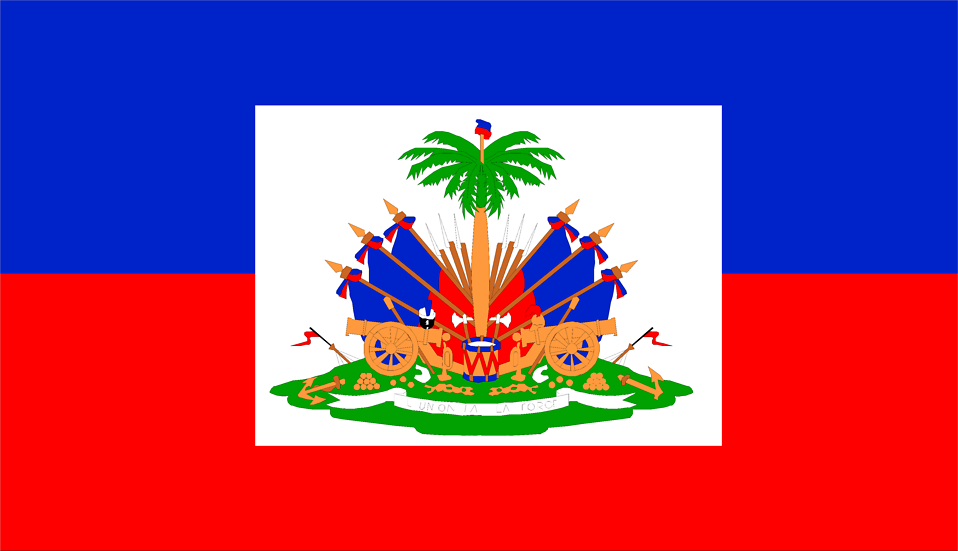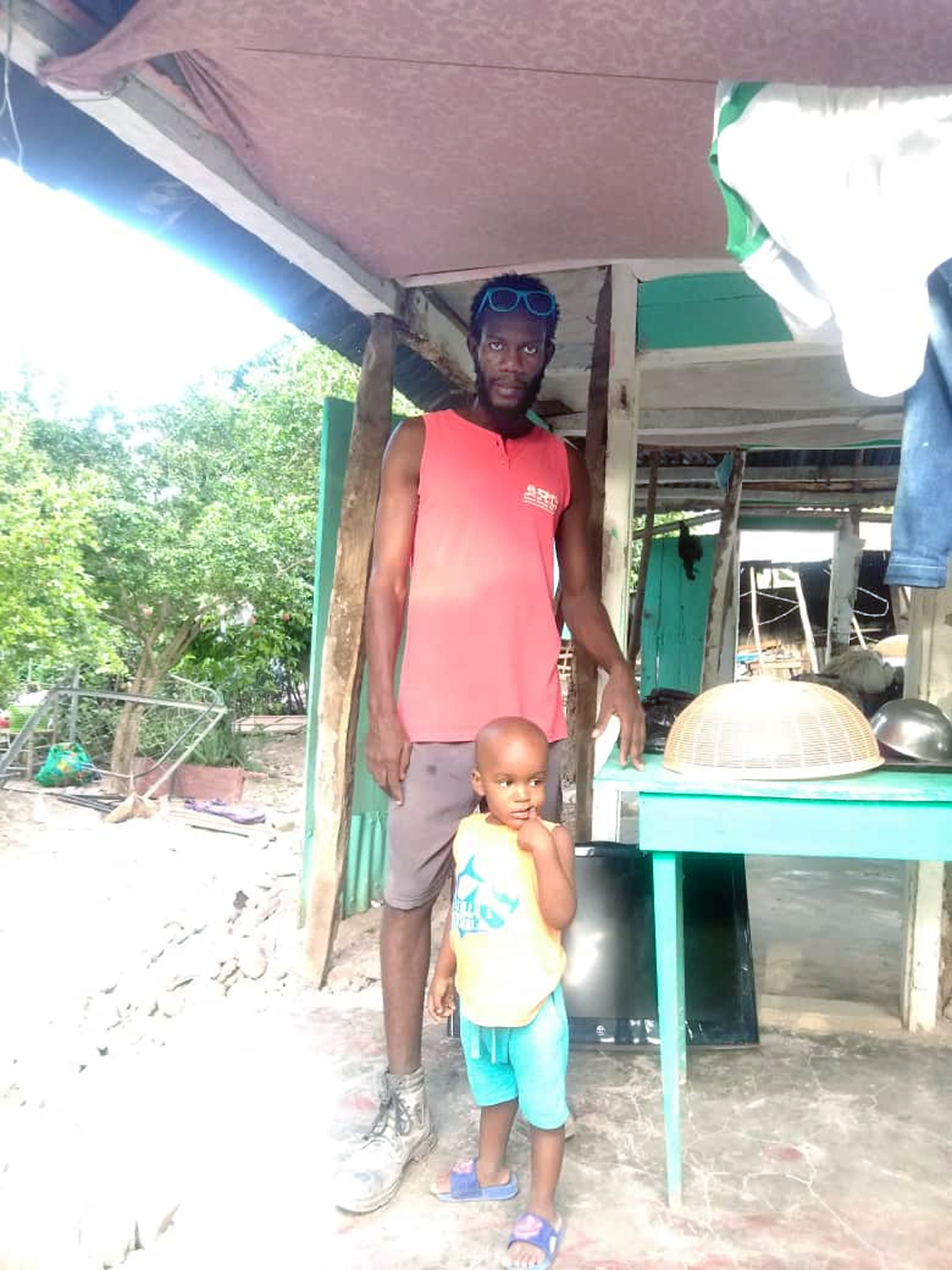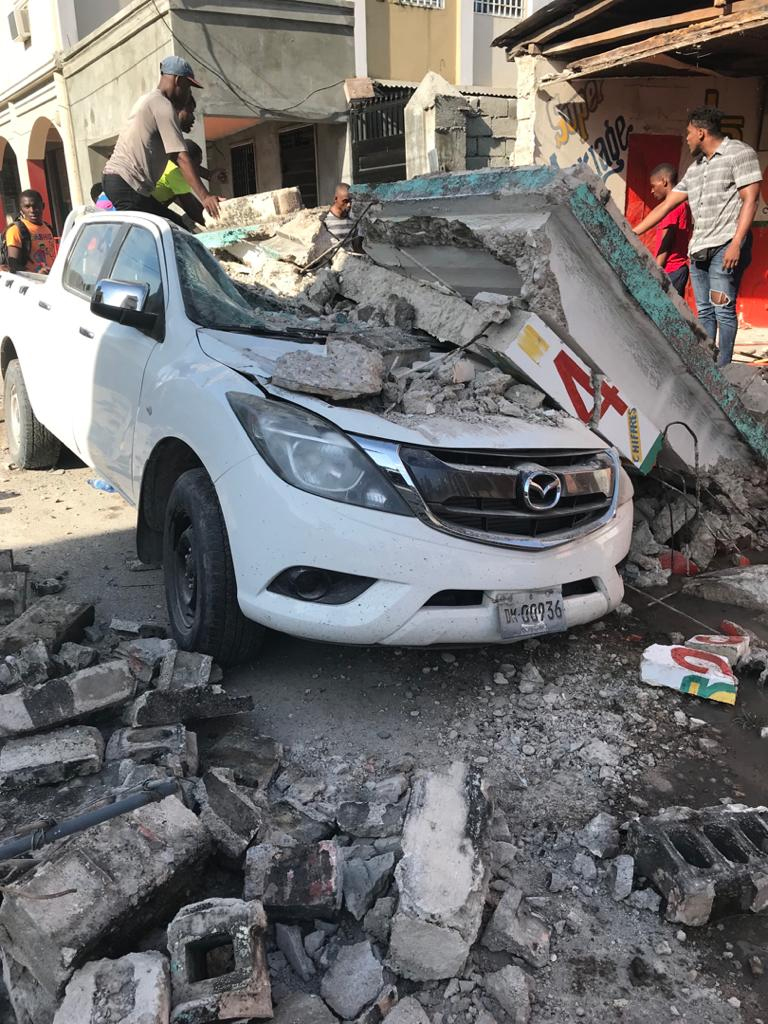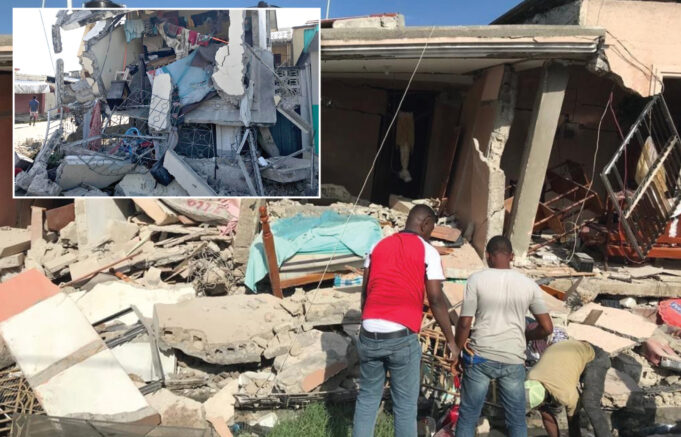by Brian E. Muhammad, Tariqah Muhammad and Nisa Islam Muhammad
Final Call Staffers @TheFinalCall
Heart wrenching images of destroyed buildings, devastating news of mounting numbers of dead and injured with frantic rescue efforts tell the story of another tragedy in Haiti after a magnitude 7.2 earthquake struck the nation. The country is reeling from back-to-back crises. Last month, Haiti experienced the assassination of its president, now an earthquake.
Those who love Haiti, however, say a determined, unified and committed effort is needed in the face of the latest disaster.
“When the earthquake happened, we immediately reached out to our friends in the embassy. In addition we’re using our center here in New York as a supplies drop off center,” said Samuel Pierre, the executive director of the Haitian American Caucus. “I was devastated, it’s just horrible. We’ve tried our best to create systems to help our people do well. Right now, it’s all planning, nothing is concrete. At the end of the day, the goal is to try that we’ll be in a position to withstand it.”
Mr. Pierre added, “The U.S. has earthquakes all the time but we have infrastructure. … We don’t have the civil engineering to withstand an earthquake. Decisions were made in the past that didn’t include infrastructure,” he said.

Part of the problem has been continued funding flowing into the coffers of non-profits who provide things like water, housing, health care and services that should be provided by the country’s government. But its political leadership backed by and often kept in place by the United States is criticized as corrupt to justify keeping money and power in the hands of non-Haitians and keeping the central government weak.
Carmella Muhammad, who is of Haitian descent and supports her Haitian family from her businesses in Chicago, said, “There’s no really sound buildings, if we were to build the infrastructure there—if they had the same infrastructure opportunities, they would work. But unfortunately, the U.S. has always had control over the government of Haiti. They put who they want to represent Haiti. Haiti has never been for the people of Haiti. But unfortunately, when you do have someone for the people of Haiti, the people have been so damaged that they don’t have trust,” the restaurant owner added.
“I would like for us to unite. Haiti is such a strong country that has given liberation (even) to America. Lord help us, Haiti has suffered tremendously. As far as I’m concerned, I think Allah (God) is trying to pull the Diaspora. There are so many in the U.S. The Diasporas, those that are from the country but have moved abroad, are educated … that have moved to the U.S. that are doing well.”

“We have Diasporas of Haiti that don’t seem to be of help to Haiti. I think it’s our responsibility, those who have moved to the U.S., to help. We have to unite,” she said. “The country has a lot of land. First of all let’s feed ourselves; let’s build our homes; let’s educate ourselves.”
The powerful quake struck Aug. 14 at 8:30 a.m. local time in the Grande Anse, Les Cayes and Nippes provinces in southern Haiti conjuring up memories of the 7.0 earthquake in January 2010 that killed upwards of 200,000 people.
“The people in that area say it’s just as bad as the one that hit the capitol in 2010,” said Kamal Frantz Muhammad of Kosaha, a local coalition building organization, from Haiti. The epicenter of the great shaking happened 78 miles west of the capital city of Port-au-Prince and was described as “very strong to severe” by the U.S. Geological Survey.
An international response is expected for an earthquake of this size, said the organization. At Final Call press time, the death toll climbed past 1,297 and desperate search and rescue efforts raced against a deluge forecast from an approaching storm. Over 5,700 people were injured with thousands more displaced from ravaged and ruined homes two days after the quake.
Kamal Muhammad, speaking from Port-Au-Prince, also said an overall lack of infrastructure was a significant cause of the destruction. Weak infrastructure and lack of resources coupled with the magnitude of the earthquake increased property losses, he said. The property losses might have been lessened if the disaster had struck the capital where structures are stronger, he explained.
“Those areas are less constructed, a lot of wooden homes, basically the people that do farming,” he said. They bring their produce to Port-Au-Prince to sell, coming from rural areas with almost nothing, Kamal Muhammad continued. Already sparse hospitals and structures were ruined, he added.
Haitians must be helped with the idea of self-sufficiency, stressed Kamal Muhammad. The world must change the way it sees and engages Haiti, traditional work that has power concentrated in the hands of charities or outsiders have been counterproductive, he said.
His group, Kohasa, unites Haitian organizations, seeks out skilled Haitians and others to help bring their skills to the first Black republic. “Charity is great,” he said. “But we have things that we can provide you, so why not do some trade and commerce with us as we regroup ourselves locally?”
Joseph Makhandal, an attorney and Haitian Representative for the Honorable Minister Louis Farrakhan of the Nation of Islam, said, “We had another previous earthquake on January 12, 2010, and that earthquake claimed 200,000 lives and one of whom was my 19 year old sister. … The first thing for recovering is to engage in short term and long term efforts so that the people who have been affected are given proper care, a place to stay, and long term wise, there should be infrastructure.
“Those who can support the government should think of long term infrastructure. I’m talking about the Diasporas in the U.S., we have been engaging in support of the government that was previously headed by our president to find ways to help him be more responsive to the need of the Haitian people,” Mr. Makhandal continued.
“We find that the best way to help the Haitian people is to build capacity with the Haitian government … as opposed to being on the sidelines, pointing fingers and not trying to be a part of the solution.”
“I want to thank the Honorable Minister Louis Farrakhan for bringing the spotlight of truth, of freedom, justice and equality to Haiti. His presence caused a ripple effect because the word he spoke there resonated with the people and continues to,” said the Muslim student minister.
On December 14, 2011, Minister Farrakhan visited Port-au-Prince and encouraged the Haitian people to unite for their own salvation. “This is your land,” he said. “Everything on it is yours! Everything under it is yours! And when your mind is free from the chains of ignorance and self-hatred, then we will free the land! We will feed ourselves again! We will grow the cotton, turn it into lint and cloth, and clothe ourselves again! We will take the wood from the trees and remove the tents and build houses for the people of Haiti to live in!”
“This is not going to come from outside, it’s going to come from you and those who love you that help you rise to your destiny,” Min. Farrakhan continued.
Student Minister Makhandal said, “What we can do, first and foremost, is organize our resources; organize it in such a way that there is coordination. … We want the Haitian organizations in the Diaspora to start thinking about categorizing those organizations so that when we move to help Haiti, we do so from a systematic way and I think that is the approach. That’s the only solution. Our unity is the key. It will solve 99 percent of our problems overnight.”

And, he observed, now Haiti is left once more at the mercy of foreign assistance which often times causes more harm than good. Amassing funds in the name of the Haitian people doesn’t necessarily get money to the Haitian people and that has been a problem, he added.
But Mr. Makhandal said, “Haiti is a history of Job on steroids,” he said referring to the Biblical figure who suffered and endured extreme tribulation. “The people continue to believe and remain resilient in their desire to survive … we refuse to give up and give in.”
It’s time for “our people,” meaning the Black man and woman in America and others who feel Haitian suffering to unite and work outside “normal channels” like the Red Cross and international organizations with histories of millions of dollars unaccounted for in Haiti, he said. There must be a push for independent aid and the mechanisms of distribution, the attorney and Nation of Islam student minister added.
Tennis star Naomi Osaka who is of Haitian and Japanese descent announced plans to assist in the relief efforts with her proceeds from the Western & Southern Open Aug. 16 in Cincinnati.
“Really hurts to see all the devastation that’s going on in Haiti,” Ms. Osaka tweeted Aug. 14. “I feel like we really can’t catch a break. I’m about to play a tournament this week and I’ll give all the prize money to relief efforts for Haiti,” she continued. “I know our ancestors’ blood is strong we’ll keep rising.”
According to Sports Illustrated, the tournament is expected to award the women’s singles winner $255,220 and the runner-up $188,945.
Ezili Danto of the Haitian Leadership Network said the earthquake must be seen in terms of divine providence, Haiti’s history and her continued exploitation by foreign interests. “I don’t know what to say people. Except, 230-years ago today, a revolution started on August 14, 1791, that shook the entire World of white body-led slavery, forced assimilation, direct colonialism, human trafficking and the terroristic slave trade,” Ms. Danto wrote in an email.
Are we “inching towards taking down” modern slavery in today’s “profit-over-people system?” she asked. She sees the continued misuse of Haiti’s resources, such as off-shore oil drilling and fracking.
The longtime fighter for the Caribbean nation said though Haitians suffer, they are “one people” and “our imperative is to destroy the profit over people system that replaced chattel slavery. No matter what it is they are trying to do, we are protected because this is also spiritual war,” Ms. Danto told The Final Call in a telephone interview.
“We know who we are, this is a sacred high land, so despite these over 500 years of terrible White body led tyranny, we are still going to dance,” Ms. Danto declared.
Cassandra Laine is a Haitian high school computer science teacher in Bethesda, Md. Her family in Haiti was spared by this earthquake. “Since the president’s assassination things have been in a disarray, the country’s been in a disarray for so long. I feel like Haiti has always been labeled as the poorest country. They don’t have the necessary resources there like in the United States,” she said referring to the assassination of President Jovenal Moises.
“In order for (Haiti) to rebuild, they need a sense of community where everyone is coming together, to build together, but they don’t have any resources to do that. They would need help from some outside countries that can come in and help them by providing resources and helping them actually rebuild, giving them that opportunity,” she added.
Ms. Laine argued Haiti needs an ally, a country to step in to really assist. “Haiti has to once again start from scratch,” she said. After the earthquake in 2010, she had family members who had to live in tents at one point.
With the country’s natural disasters, billions have often been promised to Haiti and never delivered and money has also been siphoned by a Haitian political and economic elite. “There’s no middle class in Haiti,” Ms. Laine said. “You’re either rich or wealthy or you’re poor. A lot of the stuff that went to help the people went to the more wealthier class.”
“Even though you’re starting from scratch, disasters keep hitting. If it’s not a natural disaster it’s something like covid. The poor people just keep struggling and struggling,” she said.
After that massive 2010 earthquake, Nasser Muhammad and his brother Khalifah, then a student at Morehouse College, traveled with a group of students organized by the college to do relief work in Haiti. “I had a really great experience going to Haiti,” Nasser Muhammad, chief visionary officer with Lift and Climb, an education consultants’ group, said. “I had the opportunity to go out amongst the people, handing out clothes, fresh water and medical supplies.
“My experience needs to be duplicated. I suggest that all Historically Black Colleges and Universities (HBCUs) take at least one trip to Haiti to deliver fresh water, medical supplies and clothing to help the country get back on its feet for the next 20 to 25 years until they can do for themselves,” he added.













